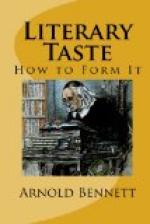You have within yourself a touchstone by which finally you can, and you must, test every book that your brain is capable of comprehending. Does the book seem to you to be sincere and true? If it does, then you need not worry about your immediate feelings, or the possible future consequences of the book. You will ultimately like the book, and you will be justified in liking it. Honesty, in literature as in life, is the quality that counts first and counts last. But beware of your immediate feelings. Truth is not always pleasant. The first glimpse of truth is, indeed, usually so disconcerting as to be positively unpleasant, and our impulse is to tell it to go away, for we will have no truck with it. If a book arouses your genuine contempt, you may dismiss it from your mind. Take heed, however, lest you confuse contempt with anger. If a book really moves you to anger, the chances are that it is a good book. Most good books have begun by causing anger which disguised itself as contempt. Demanding honesty from your authors, you must see that you render it yourself. And to be honest with oneself is not so simple as it appears. One’s sensations and one’s sentiments must be examined with detachment. When you have violently flung down a book, listen whether you can hear a faint voice saying within you: “It’s true, though!” And if you catch the whisper, better yield to it as quickly as you can. For sooner or later the voice will win. Similarly, when you are hugging a book, keep your ear cocked for the secret warning: “Yes, but it isn’t true.” For bad books, by flattering you, by caressing, by appealing to the weak or the base in you, will often persuade you what fine and splendid books they are. (Of course, I use the word “true” in a wide and essential significance. I do not necessarily mean true to literal fact; I mean true to the plane of experience in which the book moves. The truthfulness of Ivanhoe, for example, cannot be estimated by the same standards as the truthfulness of Stubbs’s Constitutional History.) In reading a book, a sincere questioning of oneself, “Is it true?” and a loyal abiding by the answer, will help more surely than any other process of ratiocination to form the taste. I will not assert that this question and answer are all-sufficient. A true book is not always great. But a great book is never untrue.
My second counsel is: In your reading you must have in view some definite aim—some aim other than the wish to derive pleasure. I conceive that to give pleasure is the highest end of any work of art, because the pleasure procured from any art is tonic, and transforms the life into which it enters. But the maximum of pleasure can only be obtained by regular effort, and regular effort implies the organisation of that effort. Open-air walking is a glorious exercise; it is the walking itself which is glorious. Nevertheless, when setting out for walking exercise, the sane man generally has a subsidiary aim in view.




